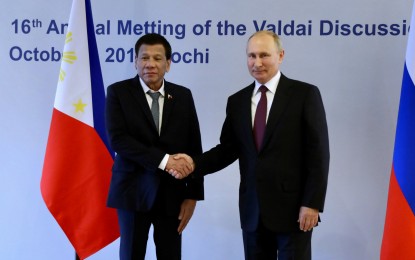
President Rodrigo Duterte and Russian President Vladimir Putin (Presidential Photo)
MANILA -- Three years into the Duterte administration, the Department of Foreign Affairs (DFA) has seen “significant headway” into Manila’s pursuit of an independent foreign policy.
"There's no need to assure you because you see. Don't listen to what we say, listen to what we've done and what we've achieved, we have achieved that independent foreign policy," Foreign Affairs Secretary Teodoro Locsin Jr. told reporters in a recent interview at the Ninoy Aquino International Airport.
For 2020, he said the agency would remain consistent in adhering to its original vision -- making sure that Manila fosters relations with traditional and non-traditional partners for the national interest of Filipinos.
"While we can, we also cultivate new friendships and keep alive old friendship," Locsin said.
The year 2019 has witnessed Manila's increased engagements with its non-traditional partners such as Russia, China, as well as its defense ally, the United States.
Last October, President Rodrigo Duterte trumpeted progress in the ties between Manila and Moscow, manifested by the Philippines vowing to have a "robust and comprehensive partnership" with Russia.
In his trip to Russia, Duterte and Russian President Vladimir Putin came up with bilateral agreements on the peaceful uses of energy, scientific research, health, culture, and foreign policy consultations.
With China, Duterte inked several agreements with Chinese President Xi Jinping when he visited Beijing for the second Belt and Road Forum for International Cooperation in April, such as the Production Capacity and Investment Cooperation and about 19 other business agreements with an estimated investment value of USD12.165 billion.
On the other hand, Manila's long-standing ally, the US, continues to assist the country in its scientific endeavors and the Marawi recovery efforts.
Last July, the two signed a 10-year deal to boost scientific collaboration at the closing of the 8th Bilateral Strategic Dialogue (BSD) between Washington and Manila.
In the same month, the US has earmarked PHP234 million in humanitarian assistance to the ongoing relief efforts in Marawi, bringing to more than PHP3.4 billion its total contribution to the city's recovery, almost two years after the conflict erupted in 2017.
Canada trash, South China Sea
While the country continued to cultivate a friendlier bond with its partners, it also exerted efforts in resolving issues with Canada and China.
In May, the waste problem between the Philippines and Canada was resolved, with the return of the dozens of containers carrying garbage from the latter after it was shipped to the country from 2013 to 2014.
This became one of the country's headlines hogging news on foreign affairs following the return of the Balangiga Bells in 2018.
On the South China Sea dispute, Manila conducts its regular Bilateral Consultative Mechanism (BCM) meetings with China, with the latest held last October in Beijing and the next in the first half of 2020.
The territorial row of both nations in the West Philippine Sea remains unresolved but the DFA regards the BCM as a platform "that can play a significant role in the enhanced and stable development of bilateral relations and peace and stability in the South China Sea, through which both sides discuss and consider ways and means to promote practical maritime cooperation and properly manage and address differences".
While the momentum of the Philippine-China relations improves, Manila continues to engage and raise its concerns with Beijing on activities in the South China Sea.
In April, Locsin reiterated that the Philippine position on the contested waters remains the same: "It is ours."
In the vast South China Sea, Vietnam and other member-states of the Association of Southeast Asian Nations have competing claims. Together with Beijing, which asserts a large portion of the waters with its invisible demarcation called the nine-dash line, ASEAN, with the Philippines as country coordinator, has targeted to conclude the negotiation on a Code of Conduct within three years.
Towards the end of the year, the talk of the town, on the other hand, was focused on the approved 2020 national budget of the US, which included a provision allowing the State Department to ban Filipino nationals involved in the "wrongful detention" of Senator Leila de Lima, one of the administration's staunchest critics, who is currently facing drug trafficking charges.
Despite this, Locsin said the relations between the Philippines and the US are still "perfect".
"(It's) perfect... that's the legislative branch. The same in Europe, sometimes the legislative branch in the European Parliament says something against us," he told reporters in a recent interview.
Securing Filipinos' welfare abroad
In ensuring the welfare of Filipinos abroad, Locsin said the Philippines has encouraged host countries to adopt legislation that is favorable to the migrant workers -- potential laws that could benefit thousands of overseas Filipino workers.

Although the DFA has continued to banner the benefits of such laws, Locsin admitted the limitations in urging a sovereign state to change its laws.
"We will continue to pressure them but more important than the law is how they are treating Filipinos. If they're treating them well, I'm going to really cultivate that relationship because it's not important for me to have words on paper," he said.
"If they treat our people well, then I would consider them friends of the Filipino people," he added.
For the distressed overseas Filipinos, Locsin said the government would continue to assist them with the DFA's Assistance-to-Nationals fund and Legal Assistance fund.
"As long as she's Filipino and she's in distress and she wants to go home, we take them home, no questions asked. What is important to me is the swiftness, the speed with which we rescue our people, take them home when they want to go home. And when we say they go home, we don't look for reasons," he said. (PNA)
